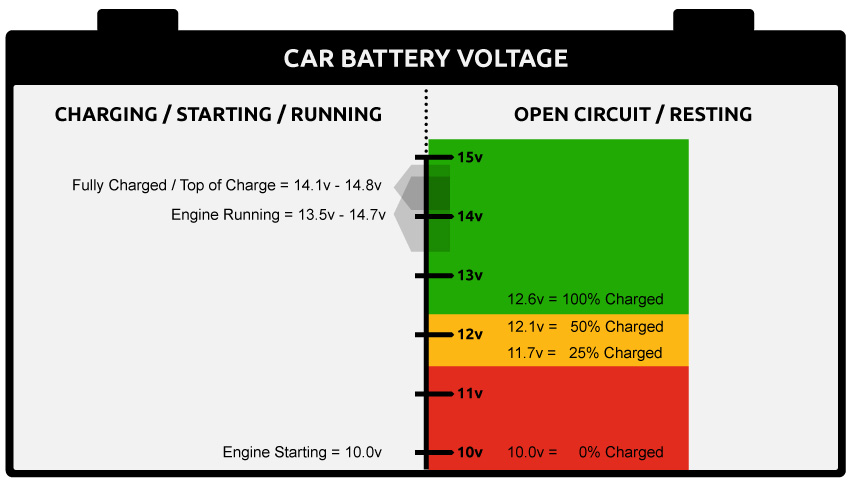A car battery typically has 12 volts. This voltage is essential for starting the vehicle and powering its electrical components.
Car batteries are crucial for providing the necessary power to start a vehicle and operate various electrical systems. Understanding the voltage of a car battery is important for ensuring optimal performance. Typically, a car battery has 12 volts, which is sufficient for igniting the engine and powering lights, radio, and other electrical features.
This voltage level is necessary for the battery to function effectively and support the vehicle’s overall operation. In this blog post, we will explore the significance of car battery voltage, its role in powering your vehicle, and how to maintain optimal voltage levels for peak performance.
Contents
Car Battery Function
In understanding the functionality of car batteries, it’s essential to grasp the basics of how they operate and their voltage specifications. The voltage of a car battery is a critical aspect that impacts its ability to power the vehicle’s electrical components. Let’s delve into the fundamental aspects of car batteries, starting with their voltage range and different types.
Voltage Range
The standard voltage range for a car battery is typically between 12.6 to 12.8 volts when fully charged. During vehicle operation, the voltage can range from 13.7 to 14.7 volts due to the alternator’s charging process. It’s crucial for the battery to maintain a voltage within this range to ensure optimal performance.
Types And Their Voltages
Car batteries come in various types, each with different voltage specifications. The most common types include:
- Lead-Acid Battery: Typically has a voltage of 2 volts per cell, with a standard 6-cell configuration resulting in a total of 12 volts.
- AGM (Absorbent Glass Mat) Battery: Similar to lead-acid batteries, they also have a standard voltage of 12 volts.
- Lithium-Ion Battery: These advanced batteries have a voltage range of 12.8 to 13.2 volts when fully charged, providing enhanced performance and longevity.

Credit: www.tycorun.com
Measuring Your Car Battery’s Voltage
It is important to know the voltage of your car battery to ensure that it is in good working condition. Measuring your car battery’s voltage is a simple process that you can do at home with the right tools. In this post, we will guide you through the step-by-step process of measuring your car battery’s voltage.
Tools Required
Before you begin measuring your car battery’s voltage, you will need the following tools:
- A digital multimeter
- A pair of safety goggles
- A pair of gloves
Step-by-step Guide
Follow these steps to measure your car battery’s voltage:
- Put on your safety goggles and gloves to protect yourself from any electrical hazards.
- Open the hood of your car and locate the battery.
- Turn off the engine and all electrical components of your car.
- Take the digital multimeter and set it to the DC voltage setting.
- Connect the red probe to the positive terminal of the battery and the black probe to the negative terminal of the battery.
- Read the voltage display on the multimeter.
- If the voltage reading is between 12.4 and 12.7 volts, your car battery is in good working condition. If the voltage reading is below 12.4 volts, your car battery may be weak and may need to be recharged or replaced.
- Remove the probes from the battery terminals.
- Close the hood of your car.
Measuring your car battery’s voltage is a simple process that can help you diagnose any issues with your car battery. By following these steps, you can ensure that your car battery is in good working condition.

Maintaining Optimal Voltage
Maintaining optimal voltage is crucial for a car battery to function properly. The average voltage for a car battery is 12 volts, but it can range from 10. 5 to 15 volts depending on the battery’s state of charge and the vehicle’s electrical system.
Tips For Prolonging Battery Life
– Regularly inspect for corrosion buildup
– Keep terminals clean and tight
– Avoid frequent short trips
– Use a battery maintainer during storage
Remember, taking care of your car battery’s voltage ensures a reliable vehicle.

Credit: www.batteriesplus.com
Frequently Asked Questions
Here are some FAQs about car battery voltage –
How Many Volts Does A Car Battery Typically Have?
A car battery typically has 12 volts, which is necessary to power the vehicle’s electrical components.
Why Is The Voltage Of A Car Battery Important?
The voltage of a car battery is important because it determines the battery’s capacity to start the engine and power the electrical systems.
Can A Car Battery Have More Than 12 Volts?
No, a car battery should not have more than 12 volts as it can damage the vehicle’s electrical system and components.
What Happens If A Car Battery Has Less Than 12 Volts?
If a car battery has less than 12 volts, it may struggle to start the engine or provide sufficient power to the vehicle’s electrical systems.
How Can I Check The Voltage Of My Car Battery?
You can check the voltage of your car battery using a multimeter, by connecting the positive and negative leads to the corresponding battery terminals.
Conclusion
Understanding the voltage of a car battery is crucial for its performance. It plays a key role in powering the vehicle’s electrical systems and starting the engine. By knowing how many volts a car battery has, you can ensure proper maintenance and make informed decisions for replacement.
Proper voltage knowledge is essential for a smooth and reliable driving experience.